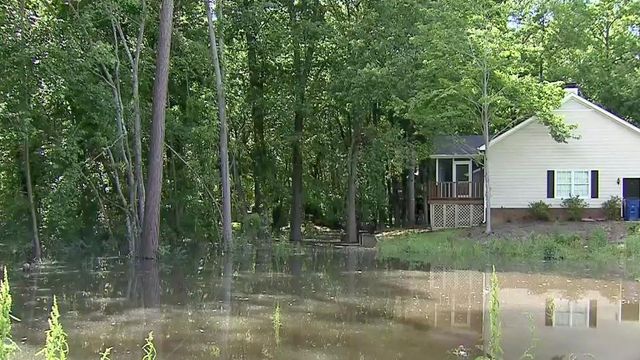Falls Lake water release floods Raleigh neighborhoods
Residents along the Neuse River, who have seen the water rise without receding over the past few weeks, are worrying about what's in store for the week ahead.
Posted — UpdatedResidents in the River Bend neighborhood are still dealing with flooding as streets remain underwater.
A similar situation exists a few miles away in the River Landing neighborhood, where backyards are flooded.
The flooding is the result of an effort by the Army Corps of Engineers to lower Falls Lake after rain raised water levels by more than 10 feet. Last week, water was being released at about 3,000 cubic feet per second and was later increased to about 6,000 cubic feet per second.
At the peak of the release, water was being released at a rate of 44,000 gallons per second.
The water is not life-threatening, but it's an inconvenience for nearby residents.
"Our entire backyard is flooded. Our crawl space is flooded, but that's not devastating. It's just very annoying," resident Pat Behrle said.
For the past week, Behrle's husband was able to hop into his kayak and paddle away from their backyard.
"Where you can see dry pavement there, he was kayaking on that last week," she said.
The couple has lived in their home in the River Landing neighborhood long enough to have their routine perfected, based on how much water is released.
“We know 3,000 puts some water in our backyard. Five thousand, we can still let the dogs out. Six thousand, backyard’s gone, we’re walking our dogs out front,” Behrle said.
Neighbors down the river are watching and waiting to see what will happen with the weather this week, with several chances for rain in the forecast.
Residents said the Army Corp of Engineers has been open with neighborhoods, explaining what they’re doing and why, but it doesn’t lessen the inconvenience for homeowners.
"It used to be about once a year. Now it seems to be two to three times a year," Behrle said.
• Credits
Copyright 2024 by Capitol Broadcasting Company. All rights reserved. This material may not be published, broadcast, rewritten or redistributed.






